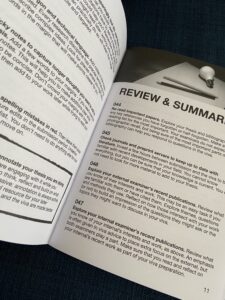Hold On To Confidence
It’s not wrong to feel nervous before your viva. It’s really important! It comes at the end of years of work and you want to succeed. It’s almost certain that anyone would feel a bit nervous, but that doesn’t mean that you can’t be confident too.
Confidence follows your actions. It grows as a result of the things we do. Once you realise it for yourself, in and amongst all of the things you do and the success you achieve, you need to hold on tight. Don’t let it get away.
Remind yourself why you feel confident of your ability. What do you do? What have you achieved? What stats or highlights help you remember?
Keep doing the things that help you to be confident, and keep reminding yourself of how far you’ve come and why you’ve made it this far.
Keep going.
PS: At the time of publication there is a little under eight hours to back 101 Steps To A Great Viva on Kickstarter! This really is your last chance to be one of the first people to get my new helpful little guide. Take a look and back it now if you want to be sure to get a copy.

